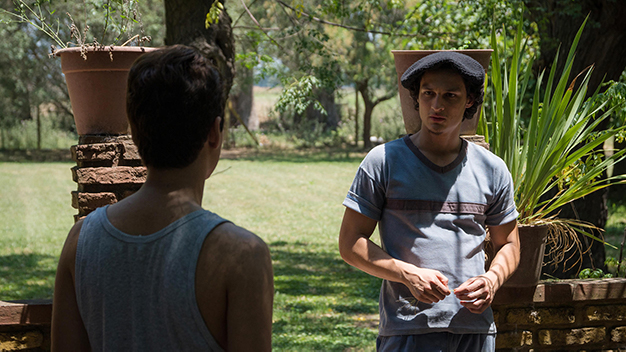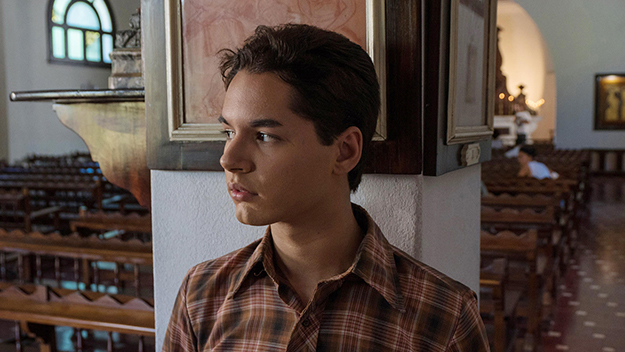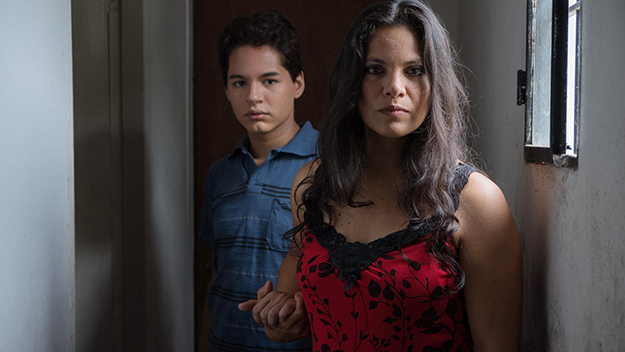Interview: José Celestino Campusano

All images from Men of Hard Skin (José Celestino Campusano, 2019)
In 2018, the International Film Festival Rotterdam hosted a near-complete retrospective of Argentine iconoclast José Celestino Campusano. For many, including your humble correspondent, it was at once an overdue introduction to a director whose work is more often rumored about than seen, and the highlight of a festival with no shortage of diverse multimedia offerings. Appetites sufficiently whetted, Campusano returned to Rotterdam in 2019 with two projects: the new narrative feature Men of Hard Skin, and a 59-minute virtual-reality piece, The Trigger’s Cult, about a corrupt cop in suburban Buenos Aires. A true rebel of international cinema, Campusano’s practice is in many ways emblematic of a bygone ideal of grassroots independent financing and distribution. His production company, the appropriately christened Cinebruto (Brute Cinema), through which he maintains a level of freedom and control over his projects afforded to few of his contemporaries, speaks to the methodology: autonomous, self-sufficient, uncompromising.
Set in a remote town in southern Buenos Aires, Men of Hard Skin follows a teenage boy named Ariel (Wall Javier) whose innocence is unceremoniously thrust toward maturity by a local priest with whom he’s involved in a clandestine sexual affair. Spurned briefly in the opening moments by the conflicted clergyman (he, like many in the parish, are engaged in a kind of ritual self-abasement for their sins) and encouraged by his free-thinking sister to explore his feelings, Ariel soon strikes up a relationship with a young farmhand. But as Ariel’s sexual and emotional awakening ensues, the twisted underbelly of the town begins to reveal itself; here, boys like Ariel are little more than pawns and playthings, while the urges, perversions, and prejudices of those in authority (like that of Ariel’s father, a respected rancher who tries to break his son’s homosexual impulses by taking him to the local whorehouse) only perpetuate the cycle of enablement and abuse. Classically composed but caustic in temperament, Campusano’s images pop with a vibrancy and authenticity of someone intimately familiar with this milieu, and indeed the filmmaker based the story on firsthand accounts of many friends and acquaintances. The ensemble cast, meanwhile, is comprised of a variety of locals and nonactors (a Campusano trademark) whose palpably seedy and offbeat demeanors add a level deranged verisimilitude to the proceedings. The result is a troubling mix of humor and depravity, a fine line that Campusano skirts with an invigorating disregard for cinematic diplomacy.
Following Men of Hard Skin’s premiere in Rotterdam, Campusano joined me to discuss the personal and political nature of his films, his dedication to community, his work with actors, and how VR is encouraging him to pursue new forms of narrative.
You mentioned in your introduction to Men of Hard Skin that all of your films are based on real people, places, and experiences. Can you tell me a little about the events that inspired Men of Hard Skin?
The story that initially inspired the film was about a friend of mine who was abused by a priest, and an investigation of local priests that happened in this area about 10 years ago. My friend had told me his story and we ended up using some of the priest’s own words as dialogue in the film. These are the kinds of things my films and the films from my production company focus on: silenced stories. Me and my team go and look for the facts, and we also work occasionally with anthropologists and sociologists who report on these types of stories. All of our films are inspired by real stories, often firsthand stories from friends. Everything you see in this film was told to me by friends and locals.
You seem to be able to work fairly independently, but do you find it at all difficult, politically or financially, to make films about such explicit subject matter?
We’ve never had problems finding funds in Argentina. We’ve made 10 of our films with the support of the Argentine National Film Board—difficult stories always, dealing with corruption, police, and politics. We don’t experience that kind of censorship. No one ever calls me to tell me I need to take out a frame or change anything. I’ve always been able to work with freedom and support.

How do you go about casting the nonprofessional actors that appear in your films, and where to you find the lead for this film, Wall Javier?
For us it makes no difference if the actors are professional or nonprofessionals. But we do want to work with people who aren’t famous. For us the group of actors is more important than the individual performer. Most of the actors come from a network of collaborators that we’ve organized, mainly friends that like working together. The child who plays Ariel lives in a very violent civil war zone. He had heard about the production and traveled to audition.
Can you discuss your writing process a little bit? Do you develop the characters or dialogue at all with the actors?
Initially I write everything, as I have to present the film to various people to raise the money. For me if you have six important, strong scenes, then you write and plan those scenes very thoroughly. The other scenes then seem to appear naturally. But every film is a little different. Fango [2012], for example, didn’t have a script going in. But once I have the actors I talk with them a lot about their characters and we change and adapt. For me it’s very important that the dialogue is realistic, and that the actors perform realistically. But what they say is written. What I enjoy is the unique style of each actor. It doesn’t matter if they’re not of the same style or temperament. What matters is their uniqueness as people. It’s more important what the actor brings to the character than what I bring to the character. Most of the industry doesn’t deal in the reality of these communities. Our production company was born with the idea to represent people and places and communities and problems that aren’t represented in the dominant cinema.
How did you come to this particular farming town?
I know the area well. I feel that there’s a loneliness to the countryside. All these issues of pedophilia between children and priests are very common there, probably more so than in the city. But we had the support of the town.

The scale of this film seems somewhat larger than your earlier films. Did you work with a bigger budget than normal?
None of my films have very big budgets. But we collaborate as much as possible and utilize our network of friends to make the most of the money we do have. I tend to shoot one or two films per year. Last year I shot five, including a VR film. The problem for me isn’t usually the shooting but postproduction, since by then we often have little budget remaining. Sometimes we have to wait a while to finish a film. But we try and move fast. That’s how we can keep it going.
What is it about VR that interests you?
I like that VR brings the viewer nearer to the action than cinema allows. In cinema, the frame forces you to see only part of what’s there. The 360-degree view allowed by VR is inclusive and hypnotic. I’m looking to explore different narrative styles through VR that I know are not possible in the traditional cinema. I just bought this. [Pulls a GoPro 360 camera from his bag.] It’s for a movie we’re going to shoot in July about displaced people in Mexico.
I’m curious about the films that have inspired your work? Do you still watch a lot of movies?
I watch a lot of films. I really like the American cinema of the 1960s through the ’80s—it’s a fantastic period where many filmmakers were working independently and with small budgets. The secret of these films is their approach to realism and how they combine fiction and documentary.
Do you feel your work utilizes nonfiction in a similar way?
Yes, very much. For me a film has to have roots in reality, or else it doesn’t exist. It also has to be politically incorrect.
Do you consider yourself a political filmmaker?
Totally. But these communities are what’s important, not my voice or me as a filmmaker. I approach these stories humbly, not through ego. It’s important that someone like you, as an outsider, can see and understand these communities and cultures through these films. They’re not often represented. You may have seen a film called Wind River [2017], about an indigenous community in Wyoming—I feel that film has similarities with my cinema and the way I tell stories. But most Argentine cinema does not.
Do you feel like you’re working apart from current Argentine cinema?
Yes, I’m apart. That’s my way.
Jordan Cronk is a critic and programmer based in Los Angeles. He runs Acropolis Cinema, a screening series for experimental and undistributed films, and is co-director of the Locarno in Los Angeles film festival.







